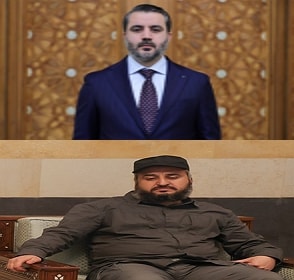By: A. Agron*
The following report is a complimentary offering from MEMRI's Jihad and Terrorism Threat Monitor (JTTM). For JTTM subscription information, click here.
Jihadi organizations often highlight and exploit divisive issues in the West as a way of promoting their own causes, and of deflecting criticism of themselves. Groups such as the Islamic State (ISIS) and Al-Qaeda are keenly aware that they can use the racial issues in the U.S. to their advantage to attract new recruits, as they stress the idea that all are equal in Islam in order to appeal to those who feel themselves to be disenfranchised and discriminated against in the West.
ISIS in particular has gone to great lengths to showcase the so-called Caliphate's alleged diversity and harmony, where all peacefully coexist. In Twitter campaigns, it has capitalized on events such as tensions such as the Baltimore unrest to promote its egalitarian agenda in which Muslims of all shades are equal, which is particularly appealing to minorities.[1] Members of minorities, including African Americans, have joined ISIS and Jabhat Al-Nusra in Syria; however, it should be noted that these recruits come from a broad variety of backgrounds. Some are college graduates, while others are former gang members.[2]
Issue 14 of AQAP's Inspire magazine, released September 9, 2015, included an article titled "The Blacks in America."[3] Issue 11 of ISIS's Dabiq, released the same day, included one titled "Wala and Bara [association and loyalty to Muslims and disassociation from non-Muslims] Versus American Racism." As can be inferred from the titles of these articles, the two groups' approaches to the issue of race differ greatly. While ISIS champions a more militant and violent approach to ameliorating racial tensions in the U.S., AQAP offers a more subtle, strategic method of addressing racial grievances, which suggests that violence may be used as a last resort. For example, Dabiq strongly endorses violent means for change, stating in the article: "So let every Muslim who wishes to taste the sweetness of wala and bara [follow] the example of Ibrahim and declare enmity towards the kuffar [infidels] amongst his own people-whether black, white, Arab, non-Arab, and march forth and wage war against them with whatever means are available to him." In contrast, the article in Inspire calls upon blacks to address their concerns to the government: "We want to hear your voices against the crimes committed by your government. We encourage you to form political groups in order to pressurize your government to lift the general oppression against you and to stop aggression towards Muslims."
The differences between ISIS and AQAP in their approaches to race issues may be viewed as a microcosm of greater ideological differences between them. While their goals are the same, they disagree vehemently over the methodology used to realize and implement their ambitions. For example, one of the most polarizing issues involves the conditions necessary to declare an Islamic caliphate: While ISIS claims – for obvious reasons, since it has declared one – to have met them, AQAP insists that these conditions are not even close to existing.[4] The two groups also disagree on what practices should be adopted – ISIS's revival of sex slavery has met with AQAP's disapproval.[5]
This report will examine the two groups' different approaches to the issue of race and their use of it to attract recruits and promote their ideology, as based upon these two pieces in the latest issues of their respective English-language magazines.
"The Blacks in America" In AQAP's Inspire
.jpg)
Article in Issue 14 of Inspire
This article, in Issue 14 of Inspire, opens with killings of Michael Brown in Ferguson, and Freddie Gray in Baltimore. It criticizes what it says are inaccurate and biased portrayals of race-based incidents on mainstream media such as Fox, but lauds TV One for what it said was its accurate coverage of "the reality on the ground." Regarding the killing of Michael Brown, the article states: "At first many channels portrayed the incident as it was, but later on presented the event to the viewer as a mere daily criminal incident. And that the victim was a person who deserved to be stopped and imprisoned. And that the crime of the officer was nothing by a general mistake that had nothing to do with racism or religion. Examples of such a channel is the 'Fox News' that has always been supporting the Anglo-Saxon community, no matter the case. The same channel that supports the existence of a Zionist state in occupied Palestine. While some channels, for example 'TV ONE'; exposed the reality on the ground: condemning and criticizing the actions of the police. They focused on presenting the problem as it was, and that it is a result of a much wider deep-rooted problem."
Stating that U.S. American politicians have addressed the issue and the situation but implying that they have a cynical ulterior motive, and that attacks on the black community will increase, it states: "The attempt by American leaders, top of them President Obama, in their addresses indicated sympathy and solidarity towards the black community. Maybe as an attempt to desensitize them from their anger." The article both subtly and overtly links discrimination against blacks to discrimination against Muslims, and says that the Western media is "persistent in portraying a negative image of Islam, with regards to Mujahideen. Racism has always been among the core issues in Islam. Verses from the Koran and Hadith have examined the solution to such problems."
In this article, AQAP appears to be trying to appeal to a broader, conventional audience, forgoing overt promotion of radical ideas in order to reach more potential recruits. Surprisingly, it expresses here concern for the oppression of non-Muslims as well: "We the Mujahideen are a portion of the Muslim Ummah, we do not accept any type of oppression against our Muslim brothers among the Afro-Americans, or even the non-Muslims." It should be noted, however, that AQAP has not actively come to the aid of minorities facing persecution in Syria, for example.
Such sentiments differ starkly from positions frequently expressed by ISIS, which focuses solely on the plight of Sunni Muslims worldwide, and are unconcerned with non-Muslims – whom it frequently brands as infidels to be at best scorned and rejected and at worst beheaded.
The AQAP article also briefly reviews selected historical racial incidents in the U.S, tracing racism itself back to early European settlers, about whom it stated: "The Europeans did not migrate with the intention of peacefully settling in this vast land... their intention was a violent forceful occupation: controlling the land by killing and destroying the population. Ruling by all means possible." It also explains that "the reader must understand the problem with regards to its historical background, so as to analyze and diagnose it in a practical detailed way."
Looking at the Civil War era, and the emancipation of the slaves, the article states that blacks attained some rights after the war because they started to vocally demand their rights. However, it adds, institutional racism is still ingrained in American society: "If you take a look at the educational opportunities, economic growth, political representation and job opportunities, you will find that most of the Afro-Americans are deprived from these basic benefits. Insufficient healthcare system, discrimination in housing benefits, law enforcement injustices."
It continues: "[B]ut what is surprising is the continual high support of the Black Africans towards the Democrats in elections. The same party in power as before, and the same oppression and injustices towards the blacks continue to repeat themselves. What is more unfortunate is that the President is of the same race, who does not pay any attention to the injustices of his own people. Rather his greatest fear is his political position and his clinging to power."
Explaining that these oppressed African Americans actually play a part in the oppression of Muslims by electing leaders who wage wars in the Middle East, the article goes on to explain that Islam prohibits discrimination, and that all types of Muslims are united as a single Muslim body.
It concludes with four steps, ranging from peaceful to militant, to alleviate the plight of African Americans. However, it first warns that blacks could be killed in their operations, but that this is justified because, it says, "our jihadi operations are defensive, even though they seem to be offensive..." The following are the four steps:
"Firstly Qaidatul Jihad and the entire Muslim Ummah are against the oppression and injustice directed towards you. And whosoever is killed among you in our jihadi operations, is justified according to us. This is because our jihadi operations are defensive, even though they seem to be offensive as in September 11..."
"Secondly: We want to hear your voices against the crimes committed by your government. We encourage you to form political groups in order to pressurize your government to lift the general oppression against you and to stop aggression towards Muslims. And condemn the support your government gives to Israel. From there we will take practical steps to avoid targeting you in your operations.
"Thirdly: Adding to the second point, we advise you to move out of big cities that represent the economy, politics or military strength of America like New York or Washington."
It should be noted that this point disregards the historical significance of the 20th century's Great Migration, and skip over all the advances gained by blacks when they moved from the South to Northern urban areas in hope of a better economic future. It is also worth pointing out that these two cities are named because they are higher priorities for AQAP attacks.
"Fourthly: Rights cannot be earned except by force, your own history is a witness to this. With that, we advise you to confront this issue in two directions 1. The first is a civil open approach, not military. Demanding your total rights, by pressuring your government using a soft approaches like: demonstrations, stage sit in and civil disobedience. 2. The second approach is by forming small groups that will be responsible for assassinating, targeting these racist politicians. "
"Fifth: We at Inspire bring to you military consultation, one may refer back to the previous issues to find appropriate military ideas."
"Wala And Bara Versus American Racism" In ISIS's Dabiq
.jpg)
Cover photo of article in Issue 11 of Dabiq
While Inspire appeals to the reader to "understand" the issues in light of "historical background," and allows readers to draw their own conclusions, the Dabiq article, in the magazine's 11th issue, [6] is notable for its use of language that is more incendiary, particularly its use of pejoratives such as "crusader" and "infidel." Dabiq claims that racial killings are insufficiently covered by the media, but that the Muslim minority living in the West is aware of the problem. Additionally, Islamic leaders in the West are criticized for seeking to portray Islam as a religion of peace.
The Dabiq article begins with criticism of the mainstream media for sweeping the racial tensions erupting in America under the rug: "The past year has seen a number of high-profile race-related incidents dominate the headlines in America, bringing the topic of racism back into the spotlight across the country, and like most other major issues that take center stage in the crusader media, racism does not go ignored by the Muslim minority living in the lands of kufr."
The Dabiq article maintains that these clerics who promote values such as tolerance are actually serving a liberal, infidel agenda. It instead appeals to an already radicalized audience, and encourages viewing the issue of racism from an Islamic perspective, i.e. "to reassert the importance and significance of wala and bara, and to state in a clear and unequivocal terms that those who wage war against Islam and the Muslims will not be spared on account of their skin color or ethnicity. The fate of a kafir [infidel] waging war against the Muslims is one and the same across the entire racial spectrum-slaughter."
Focusing on the reception awaiting Muslim immigrants as they arrive in the Islamic State, it says: "Today, non-Arab Muslims come to the lands of the Khilafah in the heart of the Arab world from all corners of the earth and are received by their Arab brothers with enthusiasm, so they can stand together and wage war against the tawaghit [unbelivers], both Arab and non-Arab alike."
Muslims, the article stresses, must reject racism in the same way that nationalism should be rejected, as a construct that is divisive, like racism: "For just as nationalist would never wage jihad beyond their borders to spread Islam to the corners of the earth and wipe out shirk [idolatry], likewise racists would not be included to disavow any members of their race except for those whom they deem 'self-hating', let alone fight them for the sake of raising high the world of Allah." The article finishes by encouraging Muslims of all races and backgrounds to band together in order to fight against their shared common enemy. "So let every Muslim who wishes to taste the sweetness of wala and bara follow the example of Ibrahim and declare enmity towards the kuffar [infidels] amongst his own people-whether black, white, Arab, non-Arab- and the march forth and wage war against them with whatever means are available to him."
Conclusion
While the two articles by these two organizations do include some overlap – they both refer to bias in the media coverage of the killing of Freddie Gray – Inspire stated that one media group had done a good job, thus making the article appear balanced. Indeed, it is notable that with its call for "assassinating... racist politicians," AQAP acknowledges that there are differences among non-Muslims – in contrast to ISIS, which in the Dabiq article calls for a crusade against all non-Muslims, lumping all of them into the category of "infidels."
Both articles contain visuals. However, while Inspire's images of police brutality, President Lincoln, and Freddie Gray and Michael Brown, ISIS, with its media capabilities, features with the Dabiq article a full-page photo of two smiling fighters, one white and one black, happily embracing in the Islamic State, demonstrating the brotherhood of all ISIS fighters.
The word count of the two articles also attests to the two organizations' differences. The Inspire article attempts to place the current racial tensions into historical context, explaining that the problem is long standing and deeply rooted; it is lengthy, comprehensive, thoughtful, and accessible to readers not familiar with Islamic concepts. In contrast, the Dabiq article is shorter and punchier, lashing out at all who it perceives as attacking both blacks and Muslims and proposing a single method for addressing grievances – a violent and militant one. Its language and the Koranic passages it cites are suitable for an audience already familiar with these concepts.
*A.Agron is a Research Fellow at MEMRI
[1] See MEMRI JTTM report The Issue Of Race In The Discourse Of The Islamic State (ISIS) And Its Supporters April 16, 2015.
[2] See MEMRI JTTM report From Aspiring Basketball Star To Jihad; American Delights In Fighting For ISIS January 19, 2015.
[3] See MEMRI JTTM report Article In Issue 14 Of AQAP's English-Language 'Inspire' Magazine Discusses Racial Tensions In U.S., Draws Parallels Between Oppression of African-Americans And Of Muslims September 9, 2015.
[4] See MEMRI JTTM report Sex Slavery In The Islamic State – Practices, Social Media Discourse, And Justifications; Jabhat Al-Nusra: ISIS Is Taking Our Women As Sex Slaves Too August 17, 2015.
[5] See MEMRI JTTM report Sex Slavery In The Islamic State – Practices, Social Media Discourse, And Justifications; Jabhat Al-Nusra: ISIS Is Taking Our Women As Sex Slaves Too August 17, 2015.
[6] See MEMRI JTTM report Issue 11 Of ISIS's 'Dabiq' Magazine Tackles America's Race Issue, Encourages All Muslims To Unite Against Common Enemy September 9, 2015.






